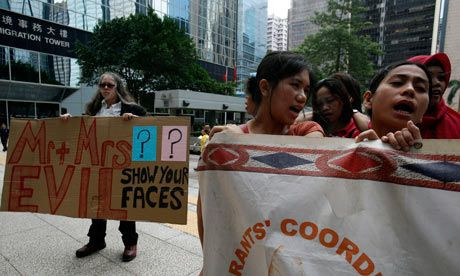Domestic Violence: Hong Kong Court Imprisons Couple For Abusing, Torturing Indonesian Maid

A court in Hong Kong has sentenced a married couple to prison for abusing and torturing their Indonesian maid in a case that highlights the plight of migrant domestic workers in the economically vibrant city-state.
Protesters and activists representing Hong Kong’s 300,000-strong maid/domestic worker community rallied outside the Wanchai District Court in support of the maid, who claimed that she endured abuse for two years, including attacks, beatings and burnings, as well as other forms of humiliation. Among other accusations, the Hong Kong couple reportedly beat their maid with paper-cutters, clothes-hangers and bicycle chains.
The Indonesian woman, Kartika Puspitasari, 30, eventually escaped her employers last October and sought refuge in the Indonesian Consulate. She detailed the repeated abuses she suffered in court, leading to the convictions of the defendants, Tai Chi-wai, 42, who was sentenced to three years and three months for assault and wounding, and his wife, Catherine Au Yuk-shan, 41, who got five-and a-half years.
The couple, who have three small children, had denied all charges.
The deputy district judge in the case, So Wai-tak, who characterized the attacks on Puspitasari as “repeated and continual,” also warned that publicity about the trial could damage Hong Kong’s reputation as a safe destination for foreign workers.
“Employers and employees in Hong Kong should resolve differences through patience and tolerance,'' So said. “[We must] send a clear message that every worker is protected by the laws.”
Puspitasari also claimed that she received no salary for her work, was forbidden from speaking to anyone and barred from ever leaving the couples' residence.
However, the judge rejected the maid’s claim that she was tied to a chair for five days without food and water while her employers went on vacation in Thailand. Conviction on that charge of false imprisonment would have likely lengthened the prison terms the defendants received.
The Standard newspaper of Hong Kong reported that protesters outside the court held up posters damning the defendants as “Mr. and Mrs. Evil'' and called on the government to “end the social exclusion of foreign domestic workers in Hong Kong.''
Activists, many of whom packed the interior of the court itself, also wanted changes in Hong Kong labor laws -- including an elimination of the clause that requires domestic servants to live in the same residences as their employers, a condition they claim places them at risk of abuse and sexual harassment. They also want the government to scrap laws that require servants to leave Hong Kong two weeks after their employment terminates.
Maids and domestic workers in Hong Kong come primarily from poorer Asian nations, notably Indonesia and the Philippines, but also from India, Sri Lanka, Bangladesh and Thailand, among others. They lack the right to a minimum wage and basic services, and they often see their passports taken away from them by their employers. They also generally have no right to permanent residency in Hong Kong.
The Mission for Migrant Workers, a longtime provider of services for migrants in Hong Kong, said in August that 58 percent of female domestic workers it surveyed had suffered verbal abuse from employers, 18 percent endured physical abuse, and 6 percent, sexual abuse.
“We call on to the Hong Kong authorities and policymakers to make the needed and urgent reforms that will mitigate the possibility of another Kartika in our midst,” the Coalition of Service Providers for Ethnic Minorities in Hong Kong said.
© Copyright IBTimes 2024. All rights reserved.




















